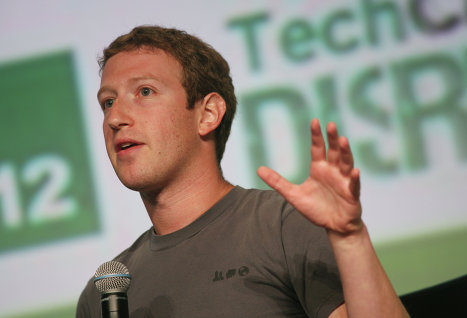
 Dmitry Medvedev, Russia’s internet-savvy prime minister, will have plenty to talk about when he meets Mark Zuckerberg, co-founder and chief executive of Facebook, in Moscow next week. The visit by the US internet entrepreneur will be an opportunity to flag Russia’s high tech innovation drive and its ability to hold its own against foreign internet companies. Zuckerberg, all too aware that Facebook has failed to conquer Russia’s vibrant social networking scene, will devote time in Moscow to scouting for talent and ideas.
Dmitry Medvedev, Russia’s internet-savvy prime minister, will have plenty to talk about when he meets Mark Zuckerberg, co-founder and chief executive of Facebook, in Moscow next week. The visit by the US internet entrepreneur will be an opportunity to flag Russia’s high tech innovation drive and its ability to hold its own against foreign internet companies. Zuckerberg, all too aware that Facebook has failed to conquer Russia’s vibrant social networking scene, will devote time in Moscow to scouting for talent and ideas.Medvedev is expected to meet Zuckerberg in Moscow on October 1st although the location and agenda for talks has not yet been decided. Zuckerberg will also meet officials from the Skolkovo Foundation, the high tech innovation center founded by Medvedev in 2010 as Russia’s answer to Silicon Valley.
Facebook has already benefited from Russian investment. Digital Sky Technologies, a venture capital firm founded by Russian internet entrepreneur Yuri Milner, bought a stake in the social networking site at the height of the financial crisis when Zuckerberg was casting around for funds.
Viktor Vekselberg, the Russian industrial magnate and president of Skolkovo, may be hoping that Facebook will now invest in Russia and follow in the steps of other IT companies by signing up as a sponsor of the centre. Cisco and IBM are already Skolkovo partners, as are smaller ventures such as US Parallels, a cloud technology specialist, and Moscow-based Frontier Ventures, a venture capital fund.
But Zuckerberg’s main mission at this point may be to tap the Russian internet market for talent and social networking ideas, rather than to invest. His visit to Moscow will coincide with the last leg of the Facebook World Hack Tour that has already taken the US company to eleven cities including Berlin, Barcelona, Jakarta, Buenos Aires and São Paulo.
The one day event begins with technical sessions before moving on to an eight hour "Hack” competition where participants can demonstrate their skills with hands-on help from Facebook engineers. The prize for the developer of the best app or project during the day will be a trip to San Francisco and even, possibly, a job with the Facebook team.
While Facebook has conquered huge swathes of the globe, it has failed to see off competition in Russia from home-grown social networking sites.
"Most of the winners in Russian internet are local players and social networks are no exception,” says Dmitry Alimov, founder of Frontier Ventures. "In Russia, Facebook is way behind Russian social networking sites. Key reasons include late market entry and limited understanding of the local internet ecosystem.”
The eight hour Hack marathon might provide Facebook with insights into what makes Russian internet chat rooms tick.
Facebook’s biggest rival in Russia is VKontakte, founded by Saint Petersburg born entrepreneur Pavel Durov two years before the US company launched its Russian language version.
Backed by Milner’s London-listed mail-ru internet company, VKontakte is now Russia’s most popular social networking site, boasting more than 40m unique users in Russia and the CIS – almost four times more than Facebook has in the area.
VKontakte has aped many of Facebook’s services but has also suffered from the US rival’s mistakes .
Durov scrapped plans to list VKontakte.ru on international markets this year as Facebook’s share price plunged in the wake of a badly handled initial public offering. The Facebook IPO had "destroyed the faith of many private investors in social networking sites,” he said.



_jpg/250px-ElbeDay1945_(NARA_ww2-121).jpg)





